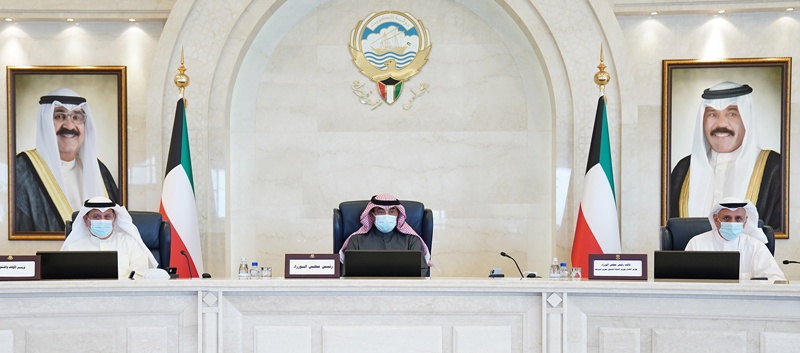KUWAIT: Kuwait's Cabinet on Monday approved a draft law to pay frontline workers fighting the coronavirus pandemic a total of KD 600 million ($1.99 billion) in special bonuses for their efforts and sacrifices to tame a local outbreak that has killed 1,298 people as of Monday.
The green-lit draft law will now be submitted to His Highness the Amir, pending its passage through parliament, Foreign Minister and Minister of State for Cabinet Affairs Sheikh Dr Ahmad Nasser Al-Sabah said in a statement following the Cabinet's weekly meeting, presided over by His Highness the Prime Minister Sheikh Sabah Al-Khaled Al-Hamad Al-Sabah.
His Highness the Premier briefed the Cabinet about His Highness the Amir Sheikh Nawaf Al-Ahmad Al-Jaber Al-Sabah's directives related to the political developments in Kuwait particularly those related to Tuesday's important parliament session. Fresh off his return from abroad for medical care, His Highness the Amir Sheikh Nawaf has stressed the "urgent need" for constructive cooperation between the Cabinet and lawmakers, a day before state ministers were due to take oath of office before parliament.
Bearing the nation's best interests in mind, the government should be given adequate time to assume its immense responsibilities to bring national ambitions to fruition, particularly at this time of upheaval wrought by the COVID-19 pandemic, His Highness the Amir added.
Meanwhile, the Cabinet reviewed the government's plan of action for the 16th legislative term (2021/2022 - 2024/25). In this regard, Finance Minister Khalifa Hamada said the government's plan is designed to focus on sustained development in the face of a myriad of challenges brought by the pandemic, a notion that fits into the country's 'New Kuwait Vision 2035' economic diversification plan. The plan, which garnered Cabinet approval, comprises objectives that aim to help shape the future of Kuwait, chief among them efforts to develop human capital, improve infrastructure and allow the private sector a bigger platform to contribute towards national development, the minister explained.
Drive-thru station
On Kuwait's latest COVID-19 data, Health Minister Sheikh Dr Basel Al-Sabah informed the Cabinet that hospital admissions and the number of people needing critical care remain on an upward trajectory, while the recovery rate has now reached 93 percent. Looking to accelerate the national rollout of COVID-19 shots, the Cabinet approved the Health ministry request to open a new drive-thru vaccination station near Sheikh Jaber Al-Ahmed Al-Sabah Causeway, urging his compatriots and expatriates alike to get inoculated and march towards "herd immunity."
The Cabinet also looked over a report prepared by an economic affairs committee over plans to put in place an alluring business environment in Kuwait that would allow it to improve its position in global investor rankings, calling for efforts across state bodies to achieve that goal.
On the political front, the Cabinet heaped praise on neighboring Saudi Arabia for a major tree-planting drive the kingdom had unveiled, which aims to combat pollution and reduce carbon emissions, a matter that featured heavily in a recent phone call between His Highness the Amir and Saudi Crown Prince Mohammed bin Salman.
It gave due praise to Riyadh for a peace initiative the kingdom presented to end Yemen's war, including a nationwide ceasefire and the reopening of air and sea links, while it strongly condemned the "terrorist" Houthi militia's continued attacks on civilian sites in Saudi Arabia.
The Cabinet equally deplored a suicide bomb attack on a Catholic church in the Indonesian city of Makassar, emphasizing that "all forms of terrorism and violence" are vehemently rejected. In Egypt, the Cabinet expressed its sympathies over the victims of a train crash and an apartment building collapse there, which collectively killed and wounded scores of people.
On a more cheerful note, the Cabinet applauded Egyptian authorities for overseeing operations to re-float a mammoth container ship that blocked the Suez Canal for almost a week, restoring traffic in one of the world's most strategic chokepoints. - KUNA
.jpg)




